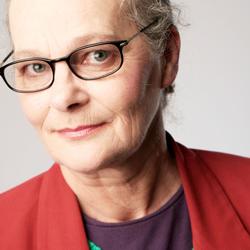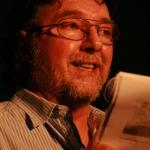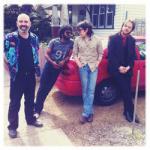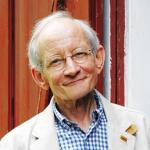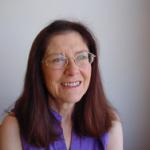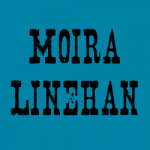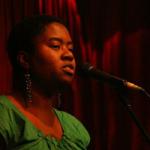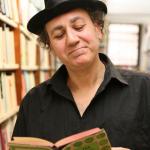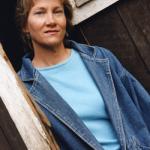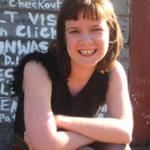All the good songs come from the men
leaning on staves - watching sheep graze
on a field without fences. So I am told.
In this country they dry hay on this sort
of wooden rack - and in that country
they dry hay on another sort of rack.
The little barefoot girl runs with a switch
through the enclave of pensions for pilgrims
after the eager cluster of early morning goats.
Two cows loll at their ease chewing good cud
viewing the laborious bent humans, grandma
and her daughter's daughter, planting spuds.
Another grandma in black kneeling among
ripe strawberries in the patch that in another
country would be her front lawn. Not a weed.
The cherry orchard slaps the windows of our bus
extravagantly. And how delicious they are, small
and so sweet in a white paper cone, and so cheap.
Jennifer Compton’s “Ex-Yugo,” were first published in Cordite 29: Pastoral (2008). The guest poetry editor for this issue was Stuart Cooke.
http://www.cordite.org.au/content/poetry/pastoral
Jennifer Compton was born in New Zealand but has been based in Australia since 1972, and is now living in Melbourne in the beachside suburb of Carrum with her husband, actor/director/writer Matthew O'Sullivan. She is a poet and playwright who also writes prose. The Big Picture, a stage play which premiered at the Griffin Theatre in Australia and at Circa Theatre in New Zealand, is published by Currency Press and was recently produced by the Perth Theatre Company in Western Australia. Her book of poetry, Barefoot, was published by Picaro Press in Australia and her latest book, This City (Otago University Press), won New Zealand’s Kathleen Grattan Award . Her poetry regularly appears in both The Best Australian Poems and Best New Zealand Poems. While she was in residence at the Whiting Library Studio in Rome she was a guest at Sarajevo Poetry Days in Bosnia and Herzegovina. More recently she has been Writer in Residence at the Randell Cottage in Wellington and Visiting Literary Artist at Massey University in Palmerston North.
I try to scrape a living together as a writer and since my children left home, taking up residencies has recently been an excellent way to do this. But my working day is pretty much the same whether I am at home or somewhere else. I usually go to bed with a good book really early and wake up before dawn, make a cup of coffee, and sit at my desk and drink it. When the good caffeine hits I start work. I used to be able to work at any time of the day or night, but these days I have to offer my desk the first cup of coffee. I won't eat until my day's work is done, usually about midday. But, of course, as I am working, I will whizz through and put a load of washing on, or chat to the husband, or weed a bit of the garden, or attend to some business, like writing a bio. I drink cup after cup of coffee, and smoke like a chimney, and get into my work and enjoy it. If the work is running hot I will get into it again after dinner. But I usually regret it because then I am wrecked the next day and I am only good for taking my grandson out for a stroll around the mall or on the beach.
An interview with Jennifer Compton
Do you consider writing poetry to be a form of work?
Oh yes. It is not a form of work. It is work. I say to my husband – “I am going to work.” Or I say – “I worked so hard last night I am knackered.” If writing poetry is not work, then nothing's work. There is, of course, always the floating moment as the words lie down on the page as they should, but getting into that moment can be so hard, and the come-down can be terrible. Now, that doesn't sound like work, does it? It sounds like addiction.
How long do you generally spend writing an individual poem?
That's a tough question. I don't know the answer to that one. Do you mean seconds, or minutes, or hours, or days, or weeks, or months or years or decades? A poem can arrive fully formed in my brain in less than seconds, or so it seems, then I can spend hours trying to remember and transcribe its lilt and taste. Then I can give up and put the draft away in a folder. Then I can stumble upon it a year or so later and suddenly see it clearly, and then the mist comes down, so away it goes again. And, in despair, I might ask for another one and a lovely, easy, unexpected one pops out of the end of my fingers and I am away laughing, as they say. A poem usually comes quickly into my head, very quickly, too quickly for my fingers. But not always.
Is work a preoccupation or theme in your poetry?
From time to time. But if it does surface as a theme then it is usually about how someone has – ''been starved into shape by this dirty game.” (Making Weight). It's not a pretty picture. I shall have to rethink that. Because I love to work. But – “I wouldn't do it for your pleasure if you paid me.” (Making Weight).
What is your attitude towards unpaid publication?
Not being paid for your work is all, alas, part of this dirty game. I try to be generous; I try to rise above it. As Les Murray writes in The Trances – “it's unlucky to pay us.” I have thrown a wobbly when someone turned around to me and said – “Oh, we're not going to pay you.” I saw red and lost it and the walls were buckling. But that was when I was asked to read something I had written for radio, and had been expecting a reader's fee as per as well as the writer's fee (pitifully little) and I jumped to the conclusion that the only reason I had been asked to read was because I was going to be cheap i.e. free. And I was probably right. I threw such a tantrum the producer agreed to pay me a reader's fee. What made it worse was that the producer was sitting on a salary and holiday pay and super and all that sort of stuff which takes the sting out of the struggle. I was ashamed of myself though, for losing it, and kept my cool the next time someone said to me – “I can't pay you. We would have to go up to the fourth floor and fill out forms and it would all take so much time.” I replied – “I have all the time in the world and we are standing right by the lifts.” But she was so discomforted because she hadn't got approval to ask me to talk to her drama students that I gently said – “This one's for free.” And it does feel good to be generous. But it does feel so crap to be broke. But when it comes to poetry I think I have nearly always been cool about being paid zilch. Everyone knows poetry is for free.
What is the smallest amount you’ve ever been paid for the publication of a poem? (note: this does not include poems for which you have not been paid at all!)
I was sent a contract from radio for $10 for a poem. I rang up in a cold, white rage and asked for $100 and the young man in the accounts department scoffed – “$100 for a poem!” So I rang up the producer who was a friend of mine and she sorted me out $150. I had to come into the city to the studio to read it (three hours by train there and three hours by train back) so fair enough.
Once I was offered $7 US by a classy American magazine, but the pages of forms I had to fill in to get the fee did my head in so I wrote back – “Consider my fee a donation.” And they seemed happy to do just that. The smallest fee I have ever received was probably my first. When I was 14/15 I sold a poem to the New Zealand Listener and received a cheque for £5 7s 6d, but that was actually a useful sum back in the 60s. So I jumped to the conclusion that there was money to be made in this game.
Describe your poetry writing work environment.
I am breaking in a new office as we have just shifted. It's a narrow sunroom with white tiles on the floor at the back of the house. The window doesn't open, so, as I smoke, I have to leave the back door open all the time. I eavesdrop on my lovely young neighbours with the new baby over the tall fence butting hard by; they spend a lot of time discussing stuff on their front porch when he gets home from work. I haven't let them know yet that I can hear them. I will. But their life together is very distracting. The room I work in is so small that I have fitted it out like a ship's cabin and I must say I do like cosy. I stare up at the bit of sky I can see and watch the waterbirds flying in to the wetland reserve close by. Our new house is an old house which has been renovated, with a long drive run up the side past our lounge room window, and a new unit built on the back on what had been the large garden. So we are cheek by jowl with neighbours which we haven't been for a long time. Until recently we lived on seven acres on the Southern Highlands of NSW. But Carrum Beach is 5 minutes walk, and Patterson River is 5 minutes walk, and there are the wetlands just down the road a ways. So we are coping. In fact we are thriving.
What do you think is the (ideal) monetary worth of a single poem?
As I write perhaps twenty poems a year, and as I could scrape by magnificently on $20,000 a year, I would be ecstatic at $1,000 per unit. Of course I earn bits and bobs from my other writing and from other sources, like the occasional bit of bar work or waitressing. I have done a few residencies since the children left home and I save ferociously during my tenure. I am lucky that I have a husband who bears the brunt of the cost of living, but he won't pay for my cigarettes. My daughter says to me - “So you are working to support your habit.” And yes, I am. But I want to contribute to daily expenses, and I want to have my own walking around money, of course. So a thousand bucks for a sonnet, great! Two thousand for an epic, if that could be arranged, thanks very much.
Have you ever worked as an editor? Describe your experience.
I have only worked as an editor in the most ramshackle and unremunerated sort of way. I am a very adamant, skewed and opinionated editor.
When asked your occupation, do you reply “poet”?
Well, no. I usually reply – “writer.” Because I am a poet and playwright who also writes prose. But an older woman is rarely asked her occupation. It seems to be fairly obvious what her occupation is. The most I seem to get these days is - “So you're retired?” “No!” I say. “I will never retire.” And then the whole dreary explanation that they probably haven't ever seen anything of mine on TV and they probably have never heard of my name etc. etc. – so sailing under the radar in the guise of old lady is probably a blessing. My husband is often asked what he does or what he did, but me – not so much.
When you were a child, what did you want to be when you grew up?
I didn't want to be anything – I didn't imagine I would grow up. It's all turned out to be quite a shock. But then, when I sold my first poem at the age of 14/15, I had a vision of a room in a boarding house in one of those narrow wooden houses up off the Aro valley in Wellington, a desk with a typewriter and I would manage to sign on for the dole (it was hard in those days, there were so many jobs) but somehow or other I would finesse it, and then I would sit and type out poems. When I needed a break, because manual typewriters are hard work, I would go out for long walks up and down the hilly streets of Wellington, looking at the people and the views of the harbour, and if I had sold a poem I would treat myself to a milkshake. I remember deciding that the one thing I really would like to afford in this vision of my ideal life was a cat. I imagined a black one. So I suppose, looking back at it, I wanted to be a poet. And I am a poet. So far, so good.

